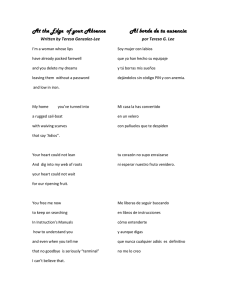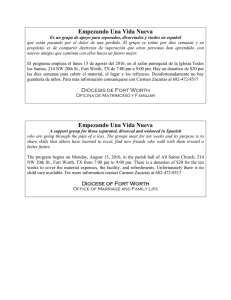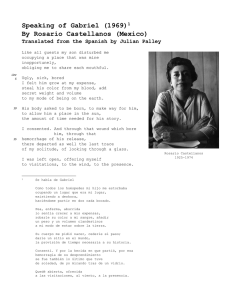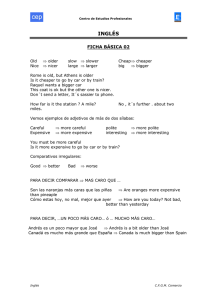Mayo 2014 - Maryville College
Anuncio
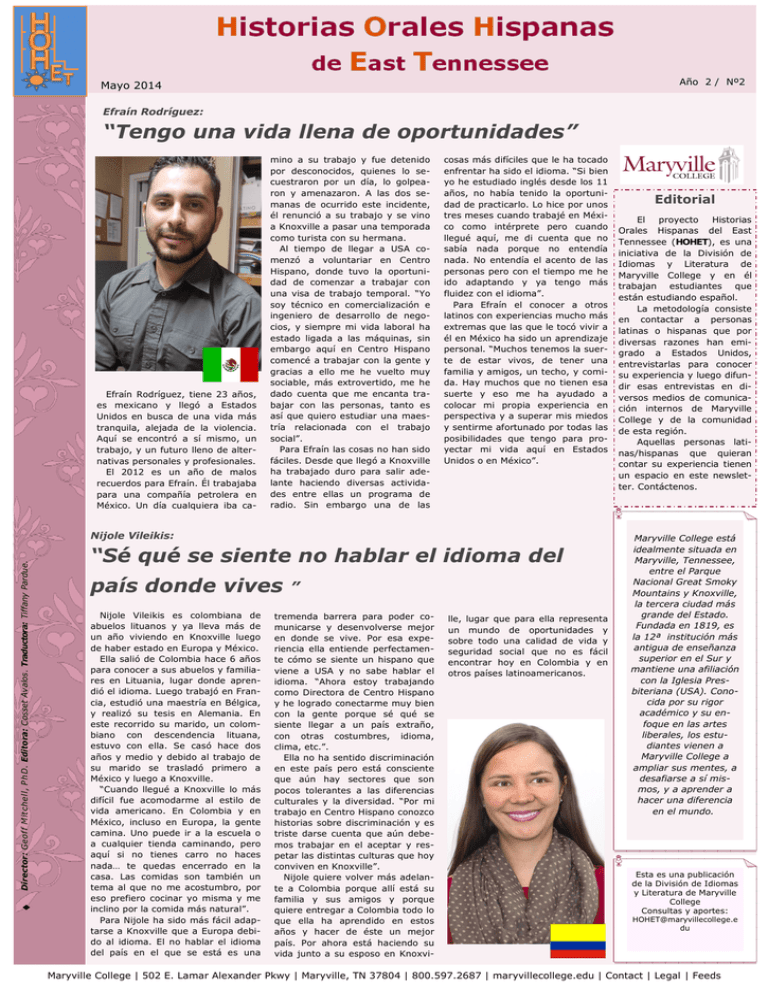
Año 2 / Nº2 Mayo 2014 Efraín Rodríguez: “Tengo una vida llena de oportunidades” Efraín Rodríguez, tiene 23 años, es mexicano y llegó a Estados Unidos en busca de una vida más tranquila, alejada de la violencia. Aquí se encontró a sí mismo, un trabajo, y un futuro lleno de alternativas personales y profesionales. El 2012 es un año de malos recuerdos para Efraín. Él trabajaba para una compañía petrolera en México. Un día cualquiera iba ca- mino a su trabajo y fue detenido por desconocidos, quienes lo secuestraron por un día, lo golpearon y amenazaron. A las dos semanas de ocurrido este incidente, él renunció a su trabajo y se vino a Knoxville a pasar una temporada como turista con su hermana. Al tiempo de llegar a USA comenzó a voluntariar en Centro Hispano, donde tuvo la oportunidad de comenzar a trabajar con una visa de trabajo temporal. “Yo soy técnico en comercialización e ingeniero de desarrollo de negocios, y siempre mi vida laboral ha estado ligada a las máquinas, sin embargo aquí en Centro Hispano comencé a trabajar con la gente y gracias a ello me he vuelto muy sociable, más extrovertido, me he dado cuenta que me encanta trabajar con las personas, tanto es así que quiero estudiar una maestría relacionada con el trabajo social”. Para Efraín las cosas no han sido fáciles. Desde que llegó a Knoxville ha trabajado duro para salir adelante haciendo diversas actividades entre ellas un programa de radio. Sin embargo una de las cosas más difíciles que le ha tocado enfrentar ha sido el idioma. “Si bien yo he estudiado inglés desde los 11 años, no había tenido la oportunidad de practicarlo. Lo hice por unos tres meses cuando trabajé en México como intérprete pero cuando llegué aquí, me di cuenta que no sabía nada porque no entendía nada. No entendía el acento de las personas pero con el tiempo me he ido adaptando y ya tengo más fluidez con el idioma”. Para Efraín el conocer a otros latinos con experiencias mucho más extremas que las que le tocó vivir a él en México ha sido un aprendizaje personal. “Muchos tenemos la suerte de estar vivos, de tener una familia y amigos, un techo, y comida. Hay muchos que no tienen esa suerte y eso me ha ayudado a colocar mi propia experiencia en perspectiva y a superar mis miedos y sentirme afortunado por todas las posibilidades que tengo para proyectar mi vida aquí en Estados Unidos o en México”. Director: Geoff M itchell, P hD. Editora: Cosset Avalos. Traductora: Tiffany Pardue. Nijole Vileikis: “Sé qué se siente no hablar el idioma del país donde vives Nijole Vileikis es colombiana de abuelos lituanos y ya lleva más de un año viviendo en Knoxville luego de haber estado en Europa y México. Ella salió de Colombia hace 6 años para conocer a sus abuelos y familiares en Lituania, lugar donde aprendió el idioma. Luego trabajó en Francia, estudió una maestría en Bélgica, y realizó su tesis en Alemania. En este recorrido su marido, un colombiano con descendencia lituana, estuvo con ella. Se casó hace dos años y medio y debido al trabajo de su marido se trasladó primero a México y luego a Knoxville. “Cuando llegué a Knoxville lo más difícil fue acomodarme al estilo de vida americano. En Colombia y en México, incluso en Europa, la gente camina. Uno puede ir a la escuela o a cualquier tienda caminando, pero aquí si no tienes carro no haces nada… te quedas encerrado en la casa. Las comidas son también un tema al que no me acostumbro, por eso prefiero cocinar yo misma y me inclino por la comida más natural”. Para Nijole ha sido más fácil adaptarse a Knoxville que a Europa debido al idioma. El no hablar el idioma del país en el que se está es una ” tremenda barrera para poder comunicarse y desenvolverse mejor en donde se vive. Por esa experiencia ella entiende perfectamente cómo se siente un hispano que viene a USA y no sabe hablar el idioma. “Ahora estoy trabajando como Directora de Centro Hispano y he logrado conectarme muy bien con la gente porque sé qué se siente llegar a un país extraño, con otras costumbres, idioma, clima, etc.”. Ella no ha sentido discriminación en este país pero está consciente que aún hay sectores que son pocos tolerantes a las diferencias culturales y la diversidad. “Por mi trabajo en Centro Hispano conozco historias sobre discriminación y es triste darse cuenta que aún debemos trabajar en el aceptar y respetar las distintas culturas que hoy conviven en Knoxville”. Nijole quiere volver más adelante a Colombia porque allí está su familia y sus amigos y porque quiere entregar a Colombia todo lo que ella ha aprendido en estos años y hacer de éste un mejor país. Por ahora está haciendo su vida junto a su esposo en Knoxvi- lle, lugar que para ella representa un mundo de oportunidades y sobre todo una calidad de vida y seguridad social que no es fácil encontrar hoy en Colombia y en otros países latinoamericanos. Editorial El proyecto Historias Orales Hispanas del East Tennessee (HOHET), es una iniciativa de la División de Idiomas y Literatura de Maryville College y en él trabajan estudiantes que están estudiando español. La metodología consiste en contactar a personas latinas o hispanas que por diversas razones han emigrado a Estados Unidos, entrevistarlas para conocer su experiencia y luego difundir esas entrevistas en diversos medios de comunicación internos de Maryville College y de la comunidad de esta región. Aquellas personas latinas/hispanas que quieran contar su experiencia tienen un espacio en este newsletter. Contáctenos. Maryville College está idealmente situada en Maryville, Tennessee, entre el Parque Nacional Great Smoky Mountains y Knoxville, la tercera ciudad más grande del Estado. Fundada en 1819, es la 12ª institución más antigua de enseñanza superior en el Sur y mantiene una afiliación con la Iglesia Presbiteriana (USA). Conocida por su rigor académico y su enfoque en las artes liberales, los estudiantes vienen a Maryville College a ampliar sus mentes, a desafiarse a sí mismos, y a aprender a hacer una diferencia en el mundo. Esta es una publicación de la División de Idiomas y Literatura de Maryville College Consultas y aportes: [email protected] du Maryville College | 502 E. Lamar Alexander Pkwy | Maryville, TN 37804 | 800.597.2687 | maryvillecollege.edu | Contact | Legal | Feeds Year 2 / Nº2 May 2014 Efraín Rodríguez: “I have a life full of opportunities ” Efraín Rodríguez, 23 years old, came to the United States in search of a peaceful life, away from the violence surrounding him in Mexico. Here he found himself, as well as a job and a future full of personal and professional alternatives. The year 2012 is one full of bad memories for Efraín. He was working for a petroleum company in Mexico. One day, walking on his way to work, he was held up by unknown men who kidnapped him for a day, beat and threatened him. Two weeks after the incident, he quit his job and came to Knoxville on a tourist visa with his sister. When he arrived in the USA, he began volunteering at Centro Hispano where he had the opportunity to start working with a temporary work visa. “I am a marketing technician and business development engineer. My work life has always centered around machines, however, here in the Centro Hispano I started to work with people, and thanks to them, I have become much more social and extroverted. I now love to work with people, so much so that I want to study something related to social work.” Things haven’t been so easy for Efraín. Since he arrived in Knoxville, he has worked hard to move forward doing various activities, such as working with a radio program. However, one of the most difficult things with which he has been confronted is the language. “I have studied English since I was 11 years old, but I had never had the opportunity to practice it. I did for about three months when I worked in Mexico as an interpreter, but when I got here, I realized that I didn’t know anything because I wasn’t understanding anything. I didn’t understand people’s accents, but over time, I have been adapting and now have more fluency in the language.” For Efraín, meeting other Latinos with experiences much more extreme than his own has been a learning experience. “Many of us are lucky to be alive, to have family and friends, a roof over their heads and food to eat. There are many that don’t have such luck, and that has helped me to put my own experience in perspective, to overcome my fears, and to feel fortunate for all the possibilities that I have in order to carry out my life here in the United States or in Mexico.” Editorial The Hispanic Oral Histories of East Tennessee (HOHET) project is an initiative of the Division of Languages and Literature at Maryville College. Those who work on it are students studying Spanish. The methodology of the project consists of three stages. First, we contact members of the Latino/Hispanic community in East Tennessee who, for various reasons, have immigrated to the United States and ultimately to this region. Then we interview them in order to understand their experiences. Finally, we disseminate these interviews via a number of media within Maryville College and the community. Any members of the Latino/Hispanic community in this region who would like to share their experiences have a place in this project and in future publications of this newsletter. Nijole Vileikis: Director: Geoff M itchell, P hD. Editor: Cosset Avalos. Translator: Tiffany Pardue. “I know how it feels to not know the language of the country in which you live Nijole Vileikis is Colombian with Lithuanian grandparents and has been living in Knoxville for over a year after having been in Europe and Mexico. She left Colombia 6 years ago to meet her grandparents and other family members in Lithuania where she also learned the language. Later, she worked in France, studied for her Masters in Belgium, and wrote her thesis in German, accompanied by her husband, who is also Colombian of Lithuanian descent. They got married two and a half years ago, and due to her husband’s work, they moved first to Mexico, and later, to Knoxville. “When I arrived in Knoxville, it was difficult adjusting to the American lifestyle. In Colombia and Mexico, even in Europe, the people walk. You can go to school or any store by walking, but here, if you don’t have a car, you don’t do anything… you’re stuck at home. The food is another thing to which I haven’t accustomed myself, so I prefer to do my own cooking and I tend to lean toward more natural foods.” For Nijole it has been easier to adjust to Knoxville than to Europe due to the language. Not being able to speak the country’s language is a tremendous barrier between being able to communicate and getting along well in the place where you live. Due to this experience, she understands perfectly how Hispanics feel when they come to the USA and don’t know how to speak the language. “Now I am working as Director of Centro Hispano and I have been able to connect very well with the people because I know how it feels to arrive in a strange country with other customs, language, climate, etc…” She hasn’t felt any discrimination in this country but is aware that there are still places that have little tolerance for cultural differences and diversity. “Since I work in Centro Hispano, I’m familiar with the stories of discrimination, and it is sad to realize that we still must work to accept and respect the different cultures that are found in Knoxville.” Nijole wants to go back to Colombia some day because her family and her friends are there and because she wants to take back all that she has learned over the years and help make Colombia ” a better country. For now, she is making a life with her husband in Knoxville, a place that represents a world of opportunities, and above all, a sense of security and a quality of life and social well-being that is not easy to find today in Colombia and other Latin American countries. . Maryville College is ideally situated in Maryville, Tenn., between the Great Smoky Mountains National Park and Knoxville, the state‘s third largest city. Founded in 1819, it is the 12th oldest institution of higher learning in the South and maintains an affiliation with the Presbyterian Church (USA). Known for its academic rigor and its focus on the liberal arts, Maryville is where students come to stretch their minds, stretch themselves and learn how to make a difference in the world. This is a publication of the Division of Language and Literature - Maryville College Questions and contributions: [email protected] du Maryville College | 502 E. Lamar Alexander Pkwy | Maryville, TN 37804 | 800.597.2687 | maryvillecollege.edu | Contact | Legal | Feeds
